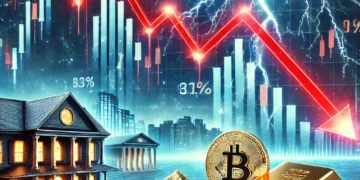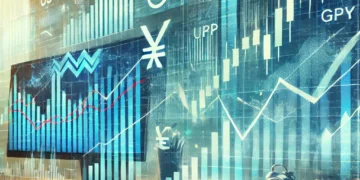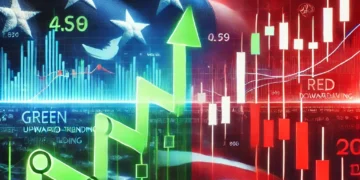What Could Trigger the Next Market Crash?
A Wave of Corporate Defaults:
Companies with high debt loads could default en masse as borrowing costs rise. Sectors such as real estate and small-cap tech are particularly vulnerable.Housing Market Correction:
Home prices in the U.S. and Europe are showing signs of peaking. If rates stay elevated, affordability will decrease, potentially causing a 20-30% drop in housing markets, reminiscent of 2008.Collapse of High-Risk Assets:
Speculative assets, including certain cryptocurrencies, meme stocks, and overhyped tech firms, could see massive sell-offs. Bitcoin, for instance, has surged over 30% in 2024, yet remains highly volatile.Banking Crisis 2.0:
Rising delinquency rates combined with shrinking liquidity could reignite fears of a banking collapse, particularly for regional banks heavily exposed to commercial real estate.
What Happens If the Market Crashes?
Immediate Financial Turmoil:
- Major indices could lose 30-50% of their value within weeks.
- Investors heavily reliant on margin could face liquidations, deepening losses.
Ripple Effects Across Economies:
- A significant crash would likely lead to mass layoffs as companies cut costs to survive.
- Consumer spending, which drives 70% of U.S. GDP, would plummet, leading to a recession.
Flight to Safety:
- Gold and U.S. Treasury bonds would likely rally as investors seek safe havens.
- Bitcoin and other cryptocurrencies may see mixed outcomes—used as an inflation hedge by some but abandoned by risk-averse investors.
Opportunities Amid Chaos:
- Savvy traders could capitalize on undervalued assets, betting on recoveries in strong sectors like renewable energy or AI.
- Advanced strategies, such as short-selling overvalued stocks or using put options, could yield profits during the downturn.
How to Prepare for the Next Crash
Diversify Your Portfolio:
- Avoid over-concentration in risky assets. A balanced portfolio across equities, bonds, and commodities reduces overall risk.
Increase Cash Reserves:
- Cash is king during market crashes, offering liquidity to capitalize on undervalued opportunities.
Monitor Economic Indicators:
- Stay informed about key metrics such as unemployment rates, consumer confidence, and central bank policy announcements.
Adopt a Long-Term View:
- Market crashes are part of the economic cycle. Historically, markets recover and often reach new highs, rewarding patient investors.
Conclusion: Market crashes, while intimidating, are not the end of the financial world—they are transformations. For prepared traders, they can be as much an opportunity as a threat. By staying informed, diversifying wisely, and planning for volatility, you can not only weather the next storm but thrive in its wake. As we look to the future, remember this: fortune favors the informed and the disciplined. Stay ahead by making preparation your greatest asset.
What are your thoughts on the next market crash? Share your insights with us at The Trader Vault, where the conversation about financial independence never stops!
























